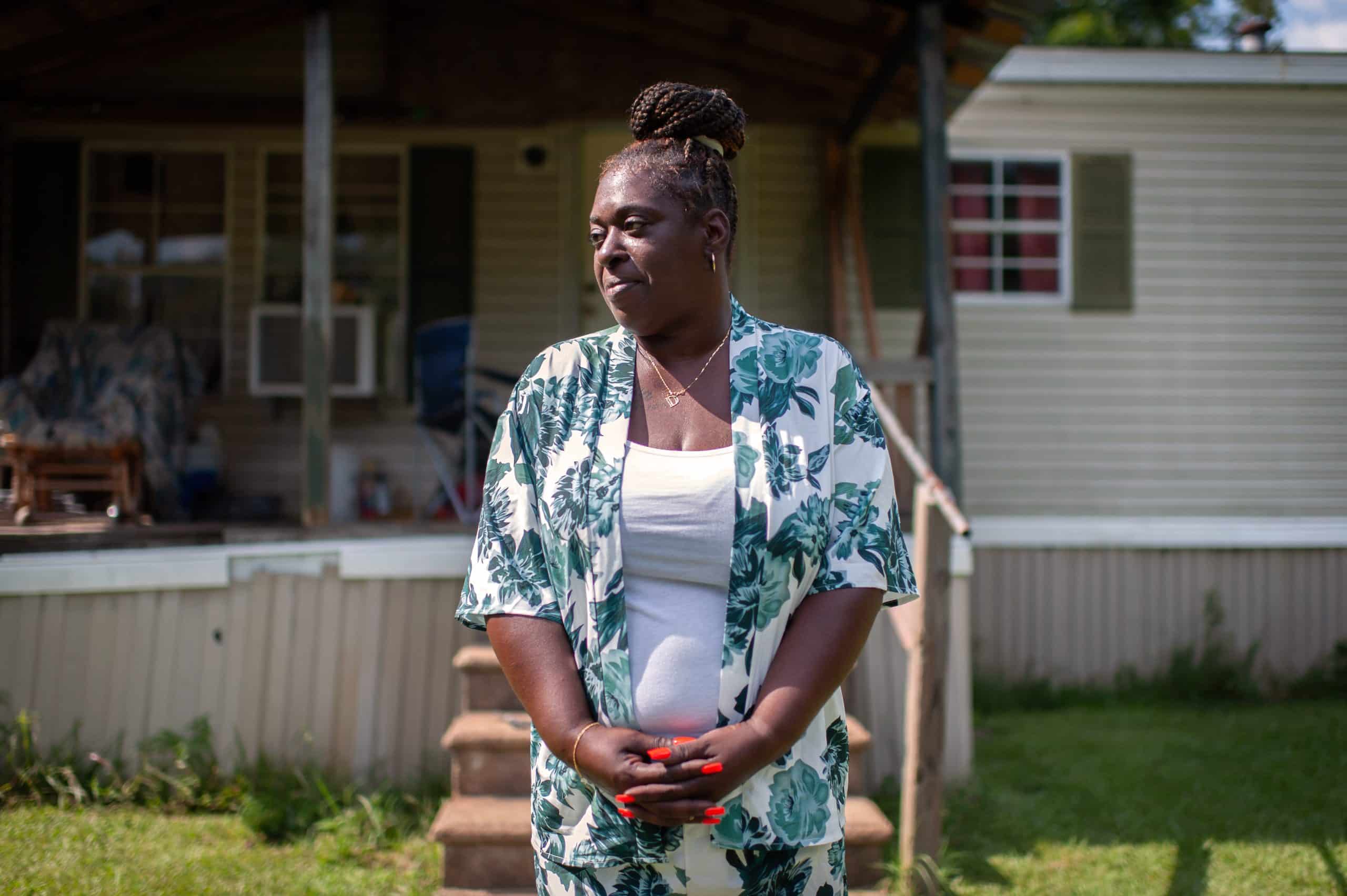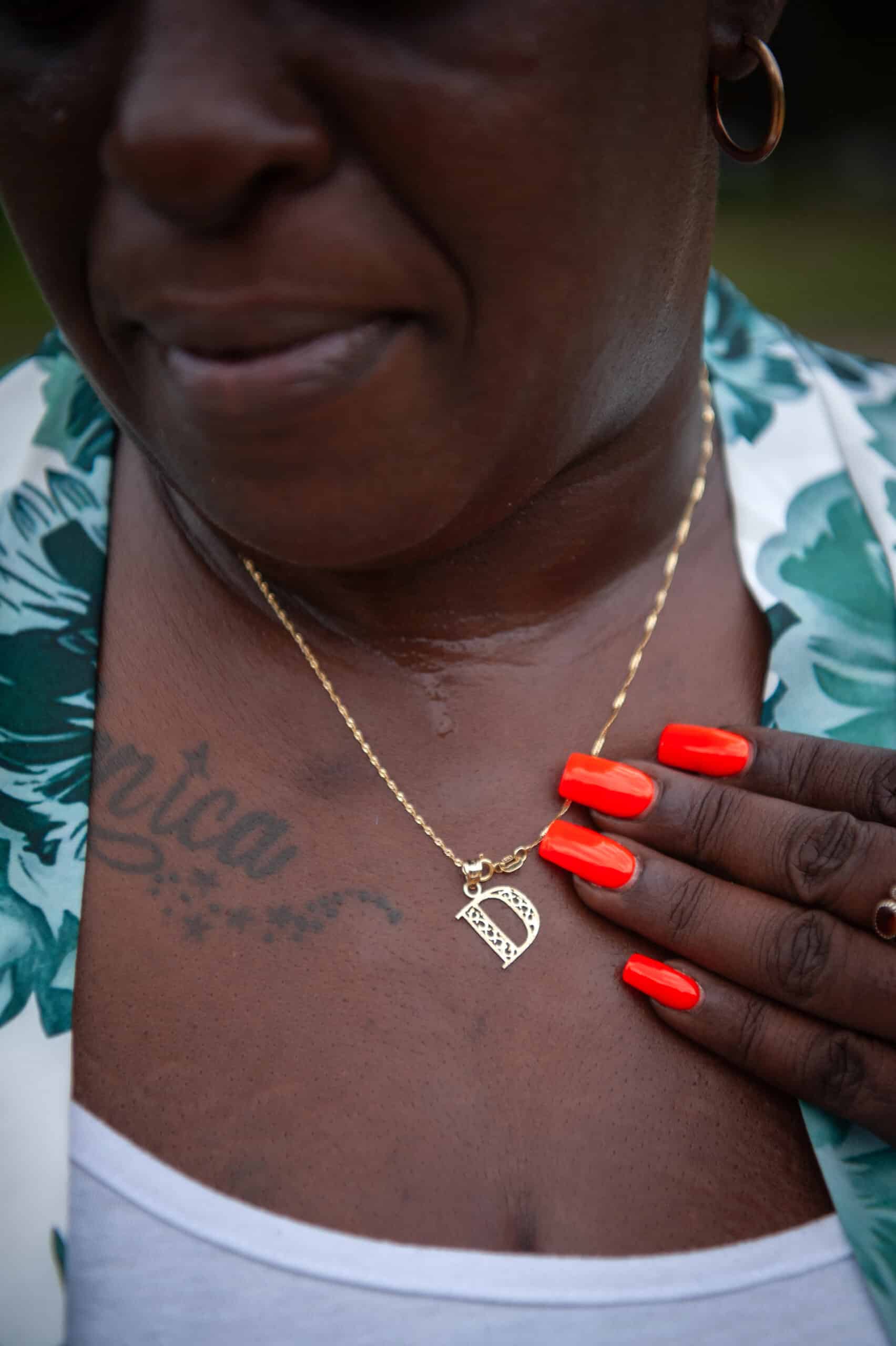Mississippi Today
New Evidence Raises Questions in Controversial Mississippi Law Enforcement Killing

When Damien Cameron’s body arrived at the Mississippi State Medical Examiner’s Office in August 2021, it bore all the signs of a police brutality case.
Mr. Cameron’s face was bloody and swollen almost beyond recognition from his struggle with Rankin County sheriff’s deputies the week before.
Signs of internal bleeding on the side of the neck of Mr. Cameron, a 29-year-old Black man, suggested a deputy might have pinned him to the ground with a knee — a dangerous restraint technique condemned by the Justice Department and banned in many cities.
But when the state’s chief medical examiner, Dr. Staci Turner, completed her autopsy, she ruled the cause of Mr. Cameron’s death “undetermined.” A grand jury later declined to indict the deputies involved.
Now, three renowned pathologists, who examined the case at the request of The New York Times and Mississippi Today, say Mr. Cameron’s death should have been ruled a homicide.
After independently reviewing autopsy photos, sheriff’s reports, hospital records and eyewitness statements saying two deputies knelt on Mr. Cameron’s neck for 10 minutes or more, the experts concluded the deputies most likely killed him.
His death was “a homicide, absolutely,” said Dr. Michael Baden, a former New York City chief medical examiner who testified in the O.J. Simpson trial and performed an independent autopsy of George Floyd. “This person died of asphyxia because of neck compression.”
“There’s really nothing to be undetermined about,” said Dr. Zhongxue Hua, chief of the forensic pathology division at Rutgers University.

The opinions of these forensic experts give new ammunition to Mr. Cameron’s family, who have struggled to bring attention to his death for more than two years. Despite local media coverage and two ?articles by the news site Insider, Mr. Cameron’s death never surfaced nationally like the cases of George Floyd or Eric Garner.
Mr. Cameron’s mother, Monica Lee, described her son as an outgoing young man who could quickly turn strangers into friends with his smile. Ms. Lee has always maintained that the deputies killed her son by violently subduing him and ignoring his cries that he could not breathe. She predicted the investigation into his death “was going to be a bunch of lies.”
Ms. Lee sued the department in 2022.
Her lawyer, Malik Shabazz, said the conclusions of the independent pathologists could change the outcome of Ms. Lee’s case. “There’s serious questions about the competency and the accuracy of the autopsy findings,” he said.
Mr. Cameron is one of at least nine men who have died during episodes involving Rankin deputies since 2014, according to department records and Mississippi Bureau of Investigation reports.
Rankin County, a rural, majority-white community outside Jackson, has been rocked by national controversy this year after five sheriff’s deputies and a local police officer broke into the home of two Black men, tortured them for two hours, sexually assaulted them with a sex toy and then shot one of them in the mouth.

On Aug. 3, Deputy Hunter Elward admitted to sticking his gun in 32-year-old Michael Jenkins’s mouth and firing it. He and the other officers, who are all white, concealed their crimes by planting a gun and drugs on their victims, disposing of security camera footage and falsifying sheriff’s reports, according to an investigation by the Justice Department. All of the officers pleaded guilty to federal and state charges in the case.
“Obviously these officers can’t be trusted,” said Sean Tindell, commissioner of the Mississippi Department of Public Safety. “There’s probably going to be a lot of reviews of every case that they’ve ever worked on.”
Mr. Elward was one of the two deputies accused of kneeling on Mr. Cameron the day he died.
A violent arrest
The only witnesses to Mr. Cameron’s arrest on July 26, 2021, were the deputies, Ms. Lee and her parents.
That afternoon, a neighbor called the police to report a burglary he believed Mr. Cameron had committed at his home in a quiet, rural neighborhood near Braxton, Miss., court records show.
When Deputy Elward arrived to investigate, Mr. Cameron, who had been diagnosed with bipolar disorder and schizophrenia, swung at him and ran away, according to the sheriff’s report.
Deputy Elward fired his Taser and tackled Mr. Cameron, he claimed in his sheriff’s report, punching him three times in the face before Deputy Luke Stickman arrived to help subdue and arrest the man.
Mr. Cameron continued to resist the deputies as they led him outside and shoved him in a patrol car, Deputy Elward contended in his report.
Shortly after, he found Mr. Cameron unresponsive. Paramedics took him to University of Mississippi Medical Center, where he was pronounced dead.
Mr. Cameron’s family said they witnessed a drastically different encounter.
In interviews with reporters, Ms. Lee said her son never tried to hit the deputy.
Hours after the incident, Mr. Cameron’s grandfather told Mississippi Bureau of Investigation agents that he had witnessed a deputy placing his knee on his grandson’s neck as he lay on the ground. The deputies did not mention kneeling on Mr. Cameron in their reports.
Ms. Lee told reporters that Deputies Elward and Stickman knelt on Mr. Cameron’s neck and back for at least 10 minutes.
“He was telling me he couldn’t breathe, he couldn’t breathe,” she said.
Mr. Cameron’s mother told reporters that he struggled to walk as the deputies took him to the patrol car and that he fell facedown in the mud in front of it.
There is no video footage of the incident.
In a written statement, Sheriff Bryan Bailey said the department had yet to deploy body-worn cameras when Mr. Cameron was arrested. Mississippi does not require law enforcement agencies to use them.

Without footage to prove her claims, Ms. Lee hoped her son’s autopsy would finally reveal the truth about his death.
But after the medical examiner’s report came back “undetermined,” the Rankin County District Attorney’s Office declined to charge the deputies. District Attorney John Bramlett, known as Bubba, did not return calls seeking comment about why he did not pursue charges.

“It was heartbreaking,” Ms. Lee said. “This is what you do every day, and you could not determine his cause of death? Why?”
Medical examiners’ findings serve as the legal foundation for prosecutors to file charges against officers involved in fatal incidents, legal experts said.
“The only person in a homicide case who can testify to the ultimate issue — that the manner of death was homicide — is a medical examiner,” said Aramis Ayala, a former Florida state attorney and a professor at Florida A&M University School of Law.
Prosecutors rarely pursue homicide charges against police officers. Without an official cause of death, experts said the chances of persuading a grand jury to indict an officer ?were slim.
A death unexplained
Dr. Turner declined to discuss the details of Mr. Cameron’s autopsy, but said there was nothing unusual about her decision not to cite a cause of death.
In cases where her office is missing information or can’t definitively cite a cause, “we err on the side of ‘undetermined’ because we don’t want to make a mistake,” she said.
Dr. Turner would not comment on what police documents and witness statements she had access to when she performed the autopsy. But in her report she wrote, “Due to lack of access to information involving the circumstance of this death, the cause and manner of death are best classified as undetermined.”
All three independent forensic pathologists said the medical examiner should have tracked down (gotten) the information she needed to make a determination. The hemorrhaging in Mr. Cameron’s neck made it clear he died of asphyxiation, they said.
“They should not have signed it on as undetermined and let it go,” said Dr. Cyril Wecht, former president of the American College of Legal Medicine and the American Academy of Forensic Science. “That was up to them to get more information from the cops.”
A toxicology report found methamphetamine in Mr. Cameron’s blood, but the pathologists? ? agreed that the drug did not cause his death.
Representatives of the medical examiner’s office said the agency would review the case again if asked by the Mississippi attorney general or the local district attorney’s office.
“It was undetermined,” said Mr. Tindell, the public safety department commissioner. “That doesn’t mean it can’t be determined later.”
In a written response to The Times, Sheriff Bailey said his department cooperated with the Mississippi Bureau of Investigation’s inquiry, noting that the bureau found no wrongdoing.
“If requested, we will fully cooperate with any future investigation into this incident by any investigative agency,” Sheriff Bailey wrote.
Mr. Shabazz said he planned to consult with the pathologists and update Ms. Lee’s lawsuit to include their findings. He hopes the new information will prompt state officials to review the case again.
Ms. Lee said she just wants the world to know the truth.
“This is what they did to my child,” she said. “You can’t tell me it was undetermined.”
This article first appeared on Mississippi Today and is republished here under a Creative Commons license.
Mississippi Today
Meet Willye B. White: A Mississippian we should all celebrate
In an interview years and years ago, the late Willye B. White told me in her warm, soothing Delta voice, “A dream without a plan is just a wish. As a young girl, I had a plan.”
She most definitely did have a plan. And she executed said plan, as we shall see.
And I know what many readers are thinking: “Who the heck was Willye B. White?” That, or: “Willye B. White, where have I heard that name before?”
Well, you might have driven an eight-mile, flat-as-a-pancake stretch of U.S. 49E, between Sidon and Greenwood, and seen the marker that says: “Willye B. White Memorial Highway.” Or you might have visited the Olympic Room at the Mississippi Sports Hall of Fame and seen where White was a five-time participant and two-time medalist in the Summer Olympics as a jumper and a sprinter.
If you don’t know who Willye B. White was, you should. Every Mississippian should. So pour yourself a cup of coffee or a glass of iced tea, follow along and prepare to be inspired.
Willye B. White was born on the last day of 1939 in Money, near Greenwood, and was raised by grandparents. As a child, she picked cotton to help feed her family. When she wasn’t picking cotton, she was running, really fast, and jumping, really high and really long distances.
She began competing in high school track and field meets at the age of 10. At age 11, she scored enough points in a high school meet to win the competition all by herself. At age 16, in 1956, she competed in the Summer Olympics at Melbourne, Australia.
Her plan then was simple. The Olympics, on the other side of the world, would take place in November. “I didn’t know much about the Olympics, but I knew that if I made the team and I went to the Olympics, I wouldn’t have to pick cotton that year. I was all for that.”
Just imagine. You are 16 years old, a high school sophomore, a poor Black girl. You are from Money, Mississippi, and you walk into the stadium at the Melbourne Cricket Grounds to compete before a crowd of more than 100,000 strangers nearly 10,000 miles from your home.
She competed in the long jump. She won the silver medal to become the first-ever American to win a medal in that event. And then she came home to segregated Mississippi, to little or no fanfare. This was the year after Emmett Till, a year younger than White, was brutally murdered just a short distance from where she lived.
“I used to sit in those cotton fields and watch the trains go by,” she once told an interviewer. “I knew they were going to some place different, some place into the hills and out of those cotton fields.”
Her grandfather had fought in France in World War I. “He told me about all the places he saw,” White said. “I always wanted to travel and see the places he talked about.”
Travel, she did. In the late 1950s there were two colleges that offered scholarships to young, Black female track and field athletes. One was Tuskegee in Alabama, the other was Tennessee State in Nashville. White chose Tennessee State, she said, “because it was the farthest away from those cotton fields.”
She was getting started on a track and field career that would take her, by her own count, to 150 different countries across the globe. She was the best female long jumper in the U.S. for two decades. She competed in Olympics in Melbourne, Rome, Tokyo, Mexico City and Munich. She would compete on more than 30 U.S. teams in international events. In 1999, Sports Illustrated named her one of the top 100 female athletes of the 20th century.
Chicago became White’s home for most of adulthood. This was long before Olympic athletes were rich, making millions in endorsements and appearance fees. She needed a job, so she became a nurse. Later on, she became an public health administrator as well as a coach. She created the Willye B. White Foundation to help needy children with health and after school care.
In 1982, at age 42, she returned to Mississippi to be inducted into the Mississippi Sports Hall of Fame and was welcomed back to a reception at the Governor’s Mansion by Gov. William Winter, who introduced her during induction ceremonies. Twenty-six years after she won the silver medal at Melbourne, she called being hosted and celebrated by the governor of her home state “the zenith of her career.”
Willye B. White died of pancreatic cancer in a Chicago hospital in 2007. While working on an obituary/column about her, I talked to the late, great Ralph Boston, the three-time Olympic long jump medalist from Laurel. They were Tennessee State and U.S. Olympic teammates. They shared a healthy respect from one another, and Boston clearly enjoyed talking about White.
At one point, Ralph asked me, “Did you know Willye B. had an even more famous high school classmate.”
No, I said, I did not.
“Ever heard of Morgan Freeman?” Ralph said, laughing.
Of course.
“I was with Morgan one time and I asked him if he ever ran track,” Ralph said, already chuckling about what would come next.
“Morgan said he did not run track in high school because he knew if he ran, he’d have to run against Willye B. White, and Morgan said he didn’t want to lose to a girl.”
This article first appeared on Mississippi Today and is republished here under a Creative Commons Attribution-NoDerivatives 4.0 International License.![]()
Mississippi Today
Early voting proposal killed on last day of Mississippi legislative session
Mississippi will remain one of only three states without no-excuse early voting or no-excuse absentee voting.
Senate leaders, on the last day of their regular 2025 session, decided not to send a bill to Gov. Tate Reeves that would have expanded pre-Election Day voting options. The governor has been vocally opposed to early voting in Mississippi, and would likely have vetoed the measure.
The House and Senate this week overwhelmingly voted for legislation that established a watered-down version of early voting. The proposal would have required voters to go to a circuit clerk’s office and verify their identity with a photo ID.
The proposal also listed broad excuses that would have allowed many voters an opportunity to cast early ballots.
The measure passed the House unanimously and the Senate approved it 42-7. However, Sen. Jeff Tate, a Republican from Meridian who strongly opposes early voting, held the bill on a procedural motion.
Senate Elections Chairman Jeremy England chose not to dispose of Tate’s motion on Thursday morning, the last day the Senate was in session. This killed the bill and prevented it from going to the governor.
England, a Republican from Vancleave, told reporters he decided to kill the legislation because he believed some of its language needed tweaking.
The other reality is that Republican Gov. Tate Reeves strongly opposes early voting proposals and even attacked England on social media for advancing the proposal out of the Senate chamber.
England said he received word “through some sources” that Reeves would veto the measure.
“I’m not done working on it, though,” England said.
Although Mississippi does not have no-excuse early voting or no-excuse absentee voting, it does have absentee voting.
To vote by absentee, a voter must meet one of around a dozen legal excuses, such as temporarily living outside of their county or being over 65. Mississippi law doesn’t allow people to vote by absentee purely out of convenience or choice.
Several conservative states, such as Texas, Louisiana, Arkansas and Florida, have an in-person early voting system. The Republican National Committee in 2023 urged Republican voters to cast an early ballot in states that have early voting procedures.
Yet some Republican leaders in Mississippi have ardently opposed early voting legislation over concerns that it undermines election security.
This article first appeared on Mississippi Today and is republished here under a Creative Commons license.
.
Mississippi Today
Mississippi Legislature approves DEI ban after heated debate
Mississippi lawmakers have reached an agreement to ban diversity, equity and inclusion programs and a list of “divisive concepts” from public schools across the state education system, following the lead of numerous other Republican-controlled states and President Donald Trump’s administration.
House and Senate lawmakers approved a compromise bill in votes on Tuesday and Wednesday. It will likely head to Republican Gov. Tate Reeves for his signature after it clears a procedural motion.
The agreement between the Republican-dominated chambers followed hours of heated debate in which Democrats, almost all of whom are Black, excoriated the legislation as a setback in the long struggle to make Mississippi a fairer place for minorities. They also said the bill could bog universities down with costly legal fights and erode academic freedom.
Democratic Rep. Bryant Clark, who seldom addresses the entire House chamber from the podium during debates, rose to speak out against the bill on Tuesday. He is the son of the late Robert Clark, the first Black Mississippian elected to the state Legislature since the 1800s and the first Black Mississippian to serve as speaker pro tempore and preside over the House chamber since Reconstruction.
“We are better than this, and all of you know that we don’t need this with Mississippi history,” Clark said. “We should be the ones that say, ‘listen, we may be from Mississippi, we may have a dark past, but you know what, we’re going to be the first to stand up this time and say there is nothing wrong with DEI.'”
Legislative Republicans argued that the measure — which will apply to all public schools from the K-12 level through universities — will elevate merit in education and remove a list of so-called “divisive concepts” from academic settings. More broadly, conservative critics of DEI say the programs divide people into categories of victims and oppressors and infuse left-wing ideology into campus life.
“We are a diverse state. Nowhere in here are we trying to wipe that out,” said Republican Sen. Tyler McCaughn, one of the bill’s authors. “We’re just trying to change the focus back to that of excellence.”
The House and Senate initially passed proposals that differed in who they would impact, what activities they would regulate and how they aim to reshape the inner workings of the state’s education system. Some House leaders wanted the bill to be “semi-vague” in its language and wanted to create a process for withholding state funds based on complaints that almost anyone could lodge. The Senate wanted to pair a DEI ban with a task force to study inefficiencies in the higher education system, a provision the upper chamber later agreed to scrap.
The concepts that will be rooted out from curricula include the idea that gender identity can be a “subjective sense of self, disconnected from biological reality.” The move reflects another effort to align with the Trump administration, which has declared via executive order that there are only two sexes.
The House and Senate disagreed on how to enforce the measure but ultimately settled on an agreement that would empower students, parents of minor students, faculty members and contractors to sue schools for violating the law.
People could only sue after they go through an internal campus review process and a 25-day period when schools could fix the alleged violation. Republican Rep. Joey Hood, one of the House negotiators, said that was a compromise between the chambers. The House wanted to make it possible for almost anyone to file lawsuits over the DEI ban, while Senate negotiators initially bristled at the idea of fast-tracking internal campus disputes to the legal system.
The House ultimately held firm in its position to create a private cause of action, or the right to sue, but it agreed to give schools the ability to conduct an investigative process and potentially resolve the alleged violation before letting people sue in chancery courts.
“You have to go through the administrative process,” said Republican Sen. Nicole Boyd, one of the bill’s lead authors. “Because the whole idea is that, if there is a violation, the school needs to cure the violation. That’s what the purpose is. It’s not to create litigation, it’s to cure violations.”
If people disagree with the findings from that process, they could also ask the attorney general’s office to sue on their behalf.
Under the new law, Mississippi could withhold state funds from schools that don’t comply. Schools would be required to compile reports on all complaints filed in response to the new law.
Trump promised in his 2024 campaign to eliminate DEI in the federal government. One of the first executive orders he signed did that. Some Mississippi lawmakers introduced bills in the 2024 session to restrict DEI, but the proposals never made it out of committee. With the national headwinds at their backs and several other laws in Republican-led states to use as models, Mississippi lawmakers made plans to introduce anti-DEI legislation.
The policy debate also unfolded amid the early stages of a potential Republican primary matchup in the 2027 governor’s race between State Auditor Shad White and Lt. Gov. Delbert Hosemann. White, who has been one of the state’s loudest advocates for banning DEI, had branded Hosemann in the months before the 2025 session “DEI Delbert,” claiming the Senate leader has stood in the way of DEI restrictions passing the Legislature.
During the first Senate floor debate over the chamber’s DEI legislation during this year’s legislative session, Hosemann seemed to be conscious of these political attacks. He walked over to staff members and asked how many people were watching the debate live on YouTube.
As the DEI debate cleared one of its final hurdles Wednesday afternoon, the House and Senate remained at loggerheads over the state budget amid Republican infighting. It appeared likely the Legislature would end its session Wednesday or Thursday without passing a $7 billion budget to fund state agencies, potentially threatening a government shutdown.
“It is my understanding that we don’t have a budget and will likely leave here without a budget. But this piece of legislation …which I don’t think remedies any of Mississippi’s issues, this has become one of the top priorities that we had to get done,” said Democratic Sen. Rod Hickman. “I just want to say, if we put that much work into everything else we did, Mississippi might be a much better place.”
This article first appeared on Mississippi Today and is republished here under a Creative Commons license.
-

 Mississippi Today3 days ago
Mississippi Today3 days agoPharmacy benefit manager reform likely dead
-

 News from the South - Oklahoma News Feed6 days ago
News from the South - Oklahoma News Feed6 days agoTornado watch, severe thunderstorm warnings issued for Oklahoma
-

 News from the South - Georgia News Feed6 days ago
News from the South - Georgia News Feed6 days agoGeorgia road project forcing homeowners out | FOX 5 News
-

 News from the South - West Virginia News Feed7 days ago
News from the South - West Virginia News Feed7 days agoHometown Hero | Restaurant owner serves up hope
-

 News from the South - Kentucky News Feed4 days ago
News from the South - Kentucky News Feed4 days agoTornado practically rips Bullitt County barn in half with man, several animals inside
-

 News from the South - Georgia News Feed7 days ago
News from the South - Georgia News Feed7 days agoBudget cuts: Senior Citizens Inc. and other non-profits worry for the future
-

 News from the South - Florida News Feed7 days ago
News from the South - Florida News Feed7 days agoStrangers find lost family heirloom at Cocoa Beach
-

 News from the South - Florida News Feed6 days ago
News from the South - Florida News Feed6 days agoRepublicans look to maintain majority in Congress ahead of Florida special election














































